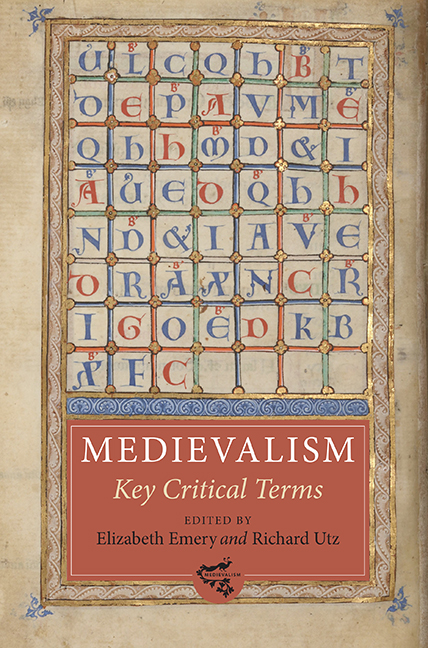Book contents
- Frontmatter
- Dedication
- Contents
- List of Illustrations
- List of Contributors
- Making Medievalism: A Critical Overview
- 1 Archive
- 2 Authenticity
- 3 Authority
- 4 Christianity
- 5 Co-disciplinarity
- 6 Continuity
- 7 Feast
- 8 Genealogy
- 9 Gesture
- 10 Gothic
- 11 Heresy
- 12 Humor
- 13 Lingua
- 14 Love
- 15 Memory
- 16 Middle
- 17 Modernity
- 18 Monument
- 19 Myth
- 20 Play
- 21 Presentism
- 22 Primitive
- 23 Purity
- 24 Reenactment
- 25 Resonance
- 26 Simulacrum
- 27 Spectacle
- 28 Transfer
- 29 Trauma
- 30 Troubadour
- Index
- Medievalism
3 - Authority
Published online by Cambridge University Press: 08 October 2022
- Frontmatter
- Dedication
- Contents
- List of Illustrations
- List of Contributors
- Making Medievalism: A Critical Overview
- 1 Archive
- 2 Authenticity
- 3 Authority
- 4 Christianity
- 5 Co-disciplinarity
- 6 Continuity
- 7 Feast
- 8 Genealogy
- 9 Gesture
- 10 Gothic
- 11 Heresy
- 12 Humor
- 13 Lingua
- 14 Love
- 15 Memory
- 16 Middle
- 17 Modernity
- 18 Monument
- 19 Myth
- 20 Play
- 21 Presentism
- 22 Primitive
- 23 Purity
- 24 Reenactment
- 25 Resonance
- 26 Simulacrum
- 27 Spectacle
- 28 Transfer
- 29 Trauma
- 30 Troubadour
- Index
- Medievalism
Summary
MEDIEVALISM IS INEXTRICABLY bound up with authority. The adaptation of, or appeal to, medieval tropes, whether philosophical, political, artistic, or popular, frequently serves as an auctoritee, an unassailable justification for the ideology and practices of the culture making the appeal. Such practice is, of course, itself an adaptation (conscious or otherwise) of the medieval appeal to ancient authority and hence a double practice of medievalism. In the last 150 years, however, a sustained habit of inventing precedent, even for texts that never existed in the Middle Ages, made such practice both more medieval and more dangerous.
The appeal to ancient authority in medieval texts originally stemmed from theological exigency to establish criteria and justification for the developing Catholic dogma. In the early Middle Ages, the Bible served as the ultimate authority (auctoritee), with God as the supreme auctor in religious and social issues. However, when the scriptures did not supply specific direction – and with a history of Roman political dominance – the mainstream Church came to rely on classical texts evincing cultural didacticism as auctoritees. In the realm of literature, this manifested first as translation into the vernacular and interpretation (frequently through glosses) of ancient texts and later as paraphrases of stories and poetry. From there, it was a short step to poets merely adopting a classical theme and claiming an ancient source to legitimize contemporary ideas. Such is Benoît de Sainte-Maure's Le Roman de Troie (1154–60), a tale of fin amor primarily of his own invention but claiming a classical heritage, cleansed (when it does peek through) of “immoral” and non-Christian elements. By the fourteenth century, poets following Benoît's lead merely nodded to the ancients, frequently inventing classical authors and sources for their original work. Chaucer, for example, appeals to an unnamed book, “myn auctor,” and the muse Clio to lend credence to Troilus and Criseyde, though, in fact, it is based on Boccaccio's Il Filostrato (c. 1336) and no ancient account of the tale has ever surfaced.
In the centuries following the close of the Middle Ages, appeals to the era in theology, philosophy, politics, and even simple tradition advanced the various agendas of churchmen and rulers, forming and reforming the ideologies and world-views of Western Europe.
- Type
- Chapter
- Information
- Medievalism: Key Critical Terms , pp. 27 - 34Publisher: Boydell & BrewerPrint publication year: 2014

